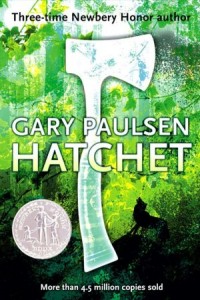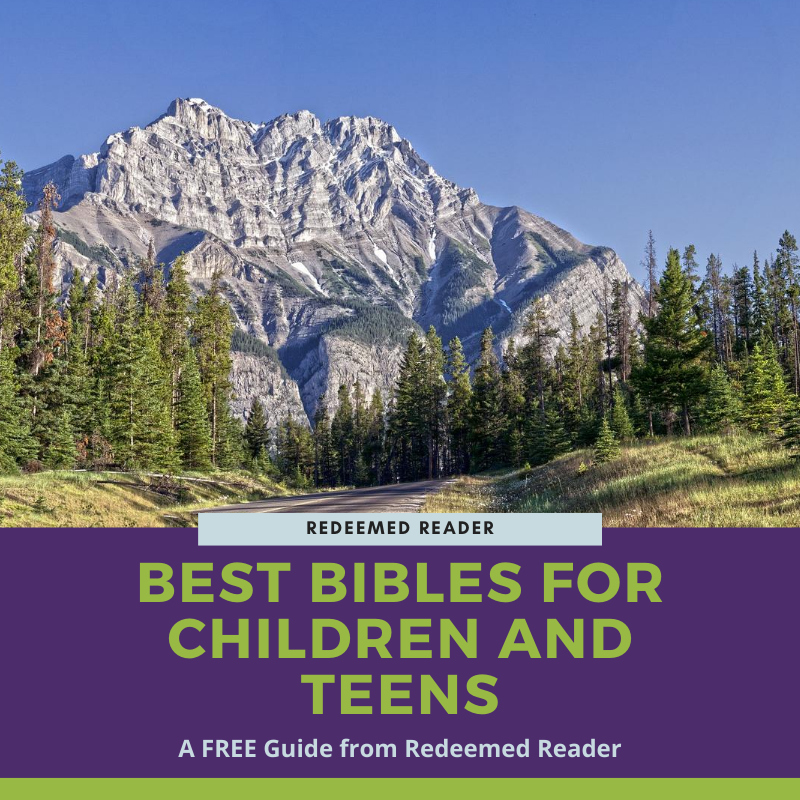Gary Paulsen’s classic survival novel Hatchet offers a realistic–as opposed to romantic– view of nature and what it takes to survive in the wild.
Hatchet by Gary Paulsen. Simon & Shuster, 1987 (paperback re-issue 2006). 192 pages
Reading Level: Middle Grades, ages 10-12
Recommended for: Ages 12-15 and up (especially boys)
In a culture where childhood is primarily a matter of motoring from one controlled environment to another, we could all use a little wilderness. At the same time, Christians believe that humans are created separately from the rest of the natural world and the Fall opened a rift that’s widened ever since. Even the most enthusiastic backpacker doesn’t disappear into the back country without the latest gear and satellite communication. (See Into the Wild or Grizzly Man for examples of young men who presumed too much on nature’s kindness.)
Jack London was a rugged individualist who lived many of the adventures he wrote about. For that very reason, characters in his fiction usually take an adversarial

At the beginning of the story, Brian Robeson, age 13, is on his way from New York to a summer visit with his father in the Canadian oil fields. He’s the only passenger in a two-seater Cessna, with a pilot friendly enough to give him a few basic flying tips. This comes in handy when, somewhere over northwest lakes, the pilot suffers a fatal heart attack and Brian is barely able to make a water landing. He manages to struggle out of the sinking plane and get to safety—or rather, to land. As night closes around him, a city boy with only the clothes on his back and the hatchet his mother gave him as a going-away present, he clearly is not safe.
The story, written in spare, Hemmingway-esque prose, develops its own compelling forward motion. In familiar order (for anyone who’s watched Cast Away or read Robinson Crusoe), he must find food, build a fire, and construct some sort of shelter, the practical imperatives of which squash all the romanticism out of him:
Never, in all the reading, in the movies he had watched on television about the outdoors, never once had they ever mentioned the mosquitoes. All they ever showed on the naturalist shows was beautiful scenery or animals jumping around having a good time. Nobody ever mentioned mosquitoes and flies.
Besides the massive discomfort of insect bites, chilly nights, and stomach cramps, death is always staring him in the face. On one memorable occasion, a rutting moose almost kills him. On another, overcome with hunger, loneliness, and the residual sadness caused by his parents’ divorce, he makes an attempt to cut his wrist. But fortunately, his heart isn’t fully committed to suicide, and his growing competence gives him reason to hope. By the time he’s finally spotted and rescued, 54 days have passed and he’s a different person—in some ways better, in some ways perhaps not. He’s certainly gained respect for the wilderness and its creatures, but it’s the respect of a kid who has fought and won. Hatchet was so popular Paulsen went on to write several spinoffs, and the brand might have lost some of its authenticity with repetition. The first book, I’m guessing, is probably the best. (See discussion questions below)
Cautions: Character issues (The boy’s mother committed adultery, leading to the parents’ divorce and the boy’s great anger), Language (some misuses of God’s name)
Overall rating: 3.75 (out of 5)
- Worldview/moral value: 3.0
- Artistic value: 5
Discussion Questions:
- When Adam and Eve disobeyed God and had to leave the garden, God told Adam that he would have to struggle to make a living off the land. How do Brian’s struggles reflect that word?
- If you’ve ever thought of spending a few days in the wild, with only a few tools to survive, how do you think the experience might change you for the better? For the worse?
Stay Up to Date!
Get the information you need to make wise choices about books for your children and teens.
Our weekly newsletter includes our latest reviews, related links from around the web, a featured book list, book trivia, and more. We never sell your information. You may unsubscribe at any time.
Support our writers and help keep Redeemed Reader ad-free by joining the Redeemed Reader Fellowship.
Stay Up to Date!
Get the information you need to make wise choices about books for your children and teens.
Our weekly newsletter includes our latest reviews, related links from around the web, a featured book list, book trivia, and more. We never sell your information. You may unsubscribe at any time.
FREE Bible Guide!
Get a guide to the Best Bibles for Children and Teens. Perfect for an Easter gift.
We'd love to hear from you!
Our comments are now limited to our members (both Silver and Golden Key). Members, you just need to log in with your normal log-in credentials!
Not a member yet? You can join the Silver Key ($2.99/month) for a free 2-week trial. Cancel at any time. Find out more about membership here.
2 Comments
Leave a Comment
You must be logged in to post a comment.


Hi! I started reading this book when it was recommended to my 8 year old son by a friend. I was concerned about some things and came to your site to get a Christian perspective. I am concerned that there are no CAUTIONS on this book. 1) It talks about a boy observing his mom kissing another man besides his dad, their subsequent divorce, and his hatred for his mom because of it. 2) It uses the name of God in vain at least 2-3 times. I have never used your site before but don’t feel that I can trust it to guide me when judging literature from a conservative Christian perspective on what to let my children read.
Jen, thank you for getting in touch with us. I wrote the Hatchet review several years ago as part of our “Environmentalist” series, as kind of a cautionary tale to over-romanticizing nature and man’s place in it. My bad–I had read the book years before and didn’t bother to reread the whole thing, causing me to miss the instances of profanity. (I usually try to flag those under “cautions”) I corrected that oversight and also upgraded the “recommended for” ages of readers–I think can be a valuable book for older kids, but 8 seems a bit young. For older readers, I would say this: Hatchet is not a Christian book and Paulsen so far as I know has not spiritual leanings. But I appreciate his unflinching look at nature, because it’s true that, after the fall, Nature is to some degree in opposition to humans. That’s why we tagged this book a “discussion starter”–our term for novels that don’t necessary express a Christian worldview, but nonetheless have some truth or insight to offer. Thanks for calling my attention to the review, and I hope you’ll give us another chance!